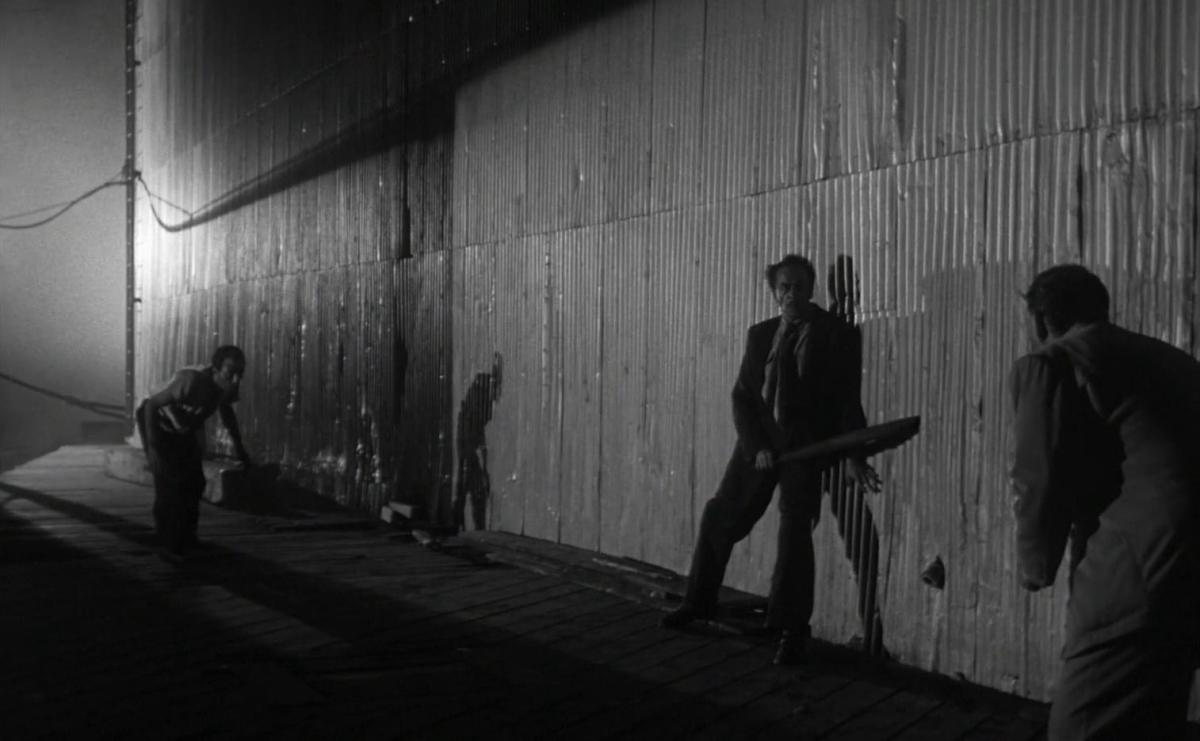‘There is something wicked and egoist and cowardly in artistic enjoyment. There are times when one can be ashamed of it, as of feasting during a plague.’ – Emmanuel Levinas
25 years ago, I listened to a discussion on Radio National in Australia about movies and politics. Not just about those films directly dealing with political issues, but also those touching on social values in a more diffuse, hidden way – whether to reinforce the status quo or subvert it. Inevitably, the chat turned to a term that some find a bit academic: ideology. And particularly that scary thing called dominant ideology. How to explain this concept, briefly and succinctly, to the RN audience? One participant, a prominent newspaper film reviewer, turned to the popular box-office hits of the time, and specifically the original Jumanji (1995) starring Robin Williams. This movie, the critic tried to explain, is sending messages into your brain, values that society wants you to obediently follow as a citizen… When pressed to formulate the film’s dominant ideology in a nutshell, this brave exegete spluttered: ‘The message of Jumanji is: stay at home!’
Back in 1995, I laughed – although I probably wouldn’t have fared any better in 30 seconds or so of live airtime. Society’s dominant ideology comes down to: stay at home?!? I couldn’t quite see, at the time, how Western capitalism could continue to function if we all did that. Yet this radio memory returned to me, around the start of March this year, when I saw, on Spanish TV, footage of a British politician speaking sternly from a podium about the spread of the coronavirus. In front of him, a placard had been hastily stuck up for the media cameras. And that sign simply declared: STAY AT HOME!
We have all experienced the global lockdown that was rolled out shortly afterwards. Staying at home was more immediately a matter of public safety than the pernicious workings of dominant ideology per se. Yet, as many politically-minded commentators have since remarked, it is striking how easily and eagerly most us obeyed this edict from above, from politicians and other law-enforcing officials. Stopped in the (otherwise empty) streets of my Spanish village by a local policeman in a patrol car during the first weeks of lockdown, and ordered to produce my ID, I was told in no uncertain terms: ‘Return to your home immediately!’ And I did. In this context, it was eerie to see The Assistant, an American film by Australian Kitty Green (Casting JonBenet, 2017). As it is still slated for a hopeful theatrical release in Australia in August, I won’t spoil anything; suffice to say, it is a chilling portrait of everyday submission to ‘the system’.
In this context, it was eerie to see The Assistant, an American film by Australian Kitty Green (Casting JonBenet, 2017). As it is still slated for a hopeful theatrical release in Australia in August, I won’t spoil anything; suffice to say, it is a chilling portrait of everyday submission to ‘the system’.
Staying indoors has produced every kind of emotion in people, from sudden euphoria (school’s out! work’s over!) to high anxiety, and everything in-between. On social media I followed the travails of my friends around the world: parents suddenly faced with the prospect of home-schooling their children; teachers having to instantly adapt to online course delivery. For a couple of freelance critics like me and my partner, with no kids, nothing much fundamentally changed in our daily routine: we have stayed at home, watched films on TV and online, wrote our articles and edited up our video essays. No trips out to a cinema, of course, for several months: all theatres remain closed in Spain as I write this piece. Ditto for art galleries and museums – so I’m still waiting for my chance to see the major exhibition devoted to American photographer-filmmaker William Klein at La Pedrera in Barcelona (including, in a sad irony, his perverse 1980 documentary about recently deceased music star Little Richard – who, mid-shoot, declared that he was following God’s command to abandon the project).
Intensifying the experience: a virus movie playlist
There is something curious that happens to fans of media during any experience of global, social crisis. They don’t necessarily want to escape the sources of that crisis and the dread feelings it prompts in them; on the contrary, they want to intensify the experience, even if in a distorting mirror. This occurred with me, and many others, directly after the tragic events of 11 September 2001 in New York: for a while, all I wanted to watch were horror, thriller and disaster movies about towers attacked or collapsing, on fire or disintegrating; and the trashier they were, the better I felt. I remember running to my local video store that very night of 11 September to grab a copy of an obscure, direct-to-video B movie (starring Dennis Hopper) that I had seen advertised in the front window: Tycus (1998) – the cover of which showed a city skyscraper crumbling amidst some cosmic storm. But, by the time I reached the shop, the proprietor had already discreetly removed all traces and copies of this film.
So, as lockdown set in, I drew up a virus movie playlist for home viewing. Classics of the genre were included, naturally: Todd Haynes’ Safe (1995) with its all-pervasive ‘allergy to the 20th century’ (the 21st has proven worse, alas), and David Cronenberg’s horrific sci-fi parables including Videodrome (1983). For an art or avant-garde touch, you can’t go past the Taiwanese master Tsai Ming-liang, whose drawn-out, minimalistic portraits of alienated urban life have become spookily prophetic: in The Hole (1998), people sequester themselves in their apartments during a viral outbreak and slowly revert to insect-like behaviour; in I Don’t Want to Sleep Alone (2006), lovers try to kiss while wearing protective, surgical masks. Sadness, disease, death are everywhere in Tsai’s work, with only occasional glimmers of ecstasy or hope. Critics once regarded his films as extravagant metaphors (for the dominant ideology, maybe?) made in the style of Michelangelo Antonioni; now they play like documentaries caught on surveillance cameras.
What do all the burglars, smugglers, drug dealers and the like do during a virus lockdown? It’s a high-risk lifestyle, after all!
But the very first virus movie in our domestic festival remains the most fascinating: Elia Kazan’s Panic in the Streets (1950). This semi-film noir zeroes in on an aspect of social life not so talked about in the news at present: the criminal underworld. What do all the burglars, smugglers, drug dealers and the like do during a virus lockdown? It’s a high-risk lifestyle, after all! In Kazan’s film, a pneumonic plague epidemic arrives at a shady port, via an even shadier arrangement involving illegal refugees. The investigation carried out by an officer of the Public Health Service (played by Richard Widmark) clashes with the priorities of local politicians and police, who would rather ignore the problem and stall on any public action (such as lockdown) until the trouble quietly fades away. But our increasingly frantic hero is right: the plague spreads through bodily contact, discarded corpses, cramped slum living conditions – and, at the centre of that milieu, touchy-feely mobsters incarnated by the likes of Jack Palance are particularly bad, as it turns out, at social distancing.
Treasures unlocked in lockdown
Of the many ‘lockdown diaries’ that have appeared online, I was particularly taken by the musings of the Italian activist and philosopher known as Bifo (Franco Berardi) – probably the most electrifying public speaker I’ve ever had the good fortune to hear. In a truly utopian moment of reverie, Bifo wonders whether, having been entirely enslaved to our domestic computer screens (for enforced work and enforced leisure) during this period, we will want to hurl our laptops into the bin once restrictions are lifted, and run out into the streets to enjoy a radical explosion of mutual affection, a ‘spontaneous caressing movement’ as he calls it.
It’s going to be a little harder, perhaps, for cinephiles to get with this movement, when and if it comes. The quarantine experience has unlocked many treasures online: individual filmmakers, archival institutions (such as the Cinémathèque française on their ‘Henri’ site and some festivals have made at least a portion of their catalogues freely accessible. I know people who are desperately gobbling all this stuff up as fast as they can, in fear of the moment when a ‘new normal’ inevitably returns and the paywalls come crashing in again.
For example, I spent a week in May virtually ‘visiting’ – as I would normally do in reality – the D’A event, a festival in Barcelona devoted to ‘auteur cinema’. Its ‘star’ section brought home further manifestations of a cinema of disquiet’ – such as Kiyoshi Kurosawa’s latest portrait of disjuncture and dislocation, To the Ends of the Earth, about a Japanese TV crew adrift in Uzbekistan; and Austrian director Jessica Hausner’s UK-set Little Joe, in which a scientifically engineered plant ends up spreading its pollen and enslaving everyone in the vicinity – a mordant and curious cross between a British TV soap opera and yet another version of Invasion of the Body Snatchers.
I also discovered the Zoom conferencing platform, and the opportunities it allows, at least during lockdown time, to eavesdrop on (and even participate in) conferences and seminars all over the world. I signed up for several sessions run by Prof. Dina Iordanova of University of St. Andrews in Scotland. One was on film criticism, featuring Jean-Michel Frodon (reviewer for the French version of Slate, former editor of Cahiers du cinéma between 2003 and 2009). The attractive bonus here was special access to viewing Aller-retour (‘Going/Returning’, 2018), a 50-minute record of a train trip taken by director Benoît Jacquot and Frodon to a screening in Orléans. Here, the expected tables are turned: it’s not critic interrogating filmmaker, but vice versa.
Against special treatment: the critic’s responsibility
Something especially popped out for me from this charming film. Jacquot keeps confronting Frodon with a disturbing idea: don’t even the best critics have, under all their apparent refinement, a ‘libido of destruction’? Don’t they really get off on laying waste, in a few well-chosen words, to something that took many people several years of hard work? ‘No, no!’, Frodon keeps insisting in response, stressing the ethical sense, the immense cultural responsibility of a dedicated critic like himself … . I fully identify with Frodon’s mission, but I can also see where Jacquot is coming from (in fact, as Frodon told the seminar, the project was inspired by his savage review of a Jacquot film in Le Monde, a piece that had strained their friendship). Especially at the time of coronavirus, when arts writers (myself included) have been advised to play nice, to be ‘gentler and kinder’ in their reviews. Well, maybe … but it seems odd advice for a critic.
at the time of coronavirus … arts writers (myself included) have been advised to play nice, to be ‘gentler and kinder’ in their reviews. Well, maybe … but it seems odd advice for a critic.
When we look back at Pauline Kael’s film reviews, for instance, is our first reaction anything like: ‘How inappropriate of her to have been so flippant and vicious about movies during that particularly traumatic period of the Vietnam War!’? Of course not. Film criticism is (as the late Thomas Elsaesser often remarked) a service industry, and its service is based on an implied contract drawn up between the critic and the viewer/consumer – not, in the primary instance, between critic and filmmaker. At a time of lockdown, people want to know, more than ever, what’s worth spending their time and (sometimes) their money on.
Critics can be a decent guide to everything in your currently shut-in life that you – perhaps ambivalently – want to see reflected and intensified via your TV or computer screen. Just take a look at I Don’t Want to Sleep Alone, The Assistant or Panic in the Streets, and you’ll soon know what I’m talking about.





